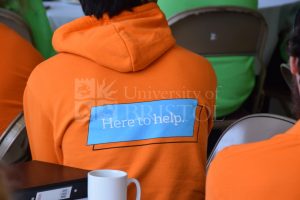 by Emma Ford, Bristol Futures Advocate
by Emma Ford, Bristol Futures Advocate
I am very excited to introduce you to your new Health Science Bristol Futures Student Advocates! We are a small group of six, very friendly, current University of Bristol students. This year we hope to share our years of experience with you. You can participate by signing up for our workshops, attending our peer support sessions, and reading our blog. So, watch this space!
Carys James
- Year and course: Veterinary Science – 4th year
- Fun fact: I have a pet African pygmy hedgehog
- Study tip: Make sure you go back over lectures throughout the whole course of the year instead of leaving it until a few weeks before exams to cover all of the content. This will keep your memory refreshed and improve it long term.
Sina Gilannejad
- Year and course: Dentistry – 5th year
- Fun fact: In first year I featured in the dental school’s YouTube video “a day in the life of a Bristol dental student” and now 33,000 have seen my terrible haircut at the time…
- Study tip: Ask for help and advice from the older years! They’ve been in your position, got the grades to prove it and can give you pointers on how to pass with flying colours!
Molly Jackson
- Year and course: 2nd year PhD student – translational health sciences
- Fun fact: I sold a necklace to the comedian Jon Richardson when I had a job at a jewellery shop.
- Study tip: Split down your revision into 5 steps to help manage your workload: record, reduce, recite, reflect, and review!
Chelsie Bailey
- Year and course: final year vet.
- Fun fact: I have a first degree in animal behaviour and welfare from Bristol.
- Study tip: Study over longer period (e.g., months) instead of cramming lots into a few weeks to allow my very dyslexic brain to have time to process it and understand.
Jess Mounty
- Year and course: 4th year Veterinary Science
- Fun fact: Before starting at Bristol, I studied Zoology at UCL
- Study tip: I have found it helpful to treat University like a full-time job, sticking to 9am-5pm working hours
Emma Ford
- Year and course: 4th year veterinary science
- Fun fact: No one can ever guess where I am from because my accent is quite uncharacteristic from growing up in international schools.
- Study tip: Make your own questions when going over your notes! It helps your brain work, and the better you get at it, the more your questions will start to resemble the ones you could get on your exams! It’s especially helpful if you can get other students involved so you make a database of questions! It’s a great resource to build over the course of the year so when you get to exams you have a lot of questions to practice!
You can find current drop-in times & locations for Health Science students on our Peer Support page on Blackboard.

 Anaya Price is from Trinidad and Tobago and is in her second year of undergraduate LLB Law. Anaya credits the pleasure of her course to her specifically chosen modules -namely Family Law, Medical Law and Crime Justice and Society- which she feels have real-life appeal and are expressed daily in our society. As a first-time advocate, she is excited to meet new people, help, and also learn from others.
Anaya Price is from Trinidad and Tobago and is in her second year of undergraduate LLB Law. Anaya credits the pleasure of her course to her specifically chosen modules -namely Family Law, Medical Law and Crime Justice and Society- which she feels have real-life appeal and are expressed daily in our society. As a first-time advocate, she is excited to meet new people, help, and also learn from others. Tala Youhana has joined the Student Advocate team this year and looks forward to being part of a friendly team and community of students, as well as engaging with the breadth of activities we have planned. As a second-year law student, Tala values the distinction between black-letter law and the open nature of its applications to society. Tala has already shown her enthusiasm via her involvement in writing articles and running workshops for the Study Skills team. A fun fact about Tara is that she has never won a game of Monopoly!
Tala Youhana has joined the Student Advocate team this year and looks forward to being part of a friendly team and community of students, as well as engaging with the breadth of activities we have planned. As a second-year law student, Tala values the distinction between black-letter law and the open nature of its applications to society. Tala has already shown her enthusiasm via her involvement in writing articles and running workshops for the Study Skills team. A fun fact about Tara is that she has never won a game of Monopoly! Aisling Mahony
Aisling Mahony Carol Huang
Carol Huang Martina Mattioli
Martina Mattioli Sabrina Choong
Sabrina Choong
 We asked Iskandar Bin Suhaimi to reflect on his time as a Bristol Futures Student Advocate, promoting Bristol Futures and running peer-led
We asked Iskandar Bin Suhaimi to reflect on his time as a Bristol Futures Student Advocate, promoting Bristol Futures and running peer-led 